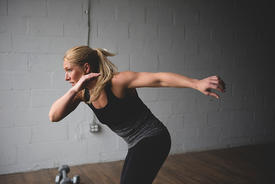does some alcohol hurt your diet
Replies
-
Hope not. Check my diary, I have a brandy in low cal hot chocolate most nights.
Hasn't stopped me losing yet!0 -
Just budget it in. I just try to keep it low cal with wine and light beer. Every now and then I'll splurge on a crown and coke or bailey's or something though.0
-
One cocktail won't kill ya! I don't remember the exact reasons/stats but on the Jillian MIchael's podcast she did say alcohol was the number one thing to get rid of though. Slows the fat burning process by 70 something percent or something nuts? I don't remember exactly...but it made me want to never drink! LOL!0
-
Since been on this Diet I have been on the drink once and the day after although I was not drunk Ive decided to stop drinking cos it made me feel disgusting but I still managed to lose weight so cant be too bad0
-
This will be interesting. I'm going to be drinking tonight probably a lot. Gonna have my "birthday party/once a year all out party," tonight. I'm willing to pay for it. Given it's once a year! :-) Ill let ya know! lol.0
-
Yesterday was my birthday and I looked up the amount of calories in my favorite drinks and budgeted for them. I also had 67 ounces of water throughout the day. I think that and dancing for 3.5 hours helped curb a weight gain.0
-
A lot of peole have responded so not sure what good this will do BUT I haven't stopped drinking. I also add my drinks to my diary and I try to workout extra if I toss a few too many back
 Just recognize how many calories are in liquor and remember, everything in moderation
Just recognize how many calories are in liquor and remember, everything in moderation  I wouldn't recommend getting wasted every night ;-) 0
I wouldn't recommend getting wasted every night ;-) 0 -
I drink and I log them. I know I'm going out tonight so doing extra exercises for that. And I will try to have a low carb hi protein dinner before. Not sure if that makes a difference except for in my head tho LOL0
-
Alcohol usually leads me to engage in activities that burn more calories, so it all evens out in the end.0
-
I'm drinking vodka and water right now...
I just make sure I workout hard to have the calories for it...
and I always log it to keep myself from going over my goal 0
0 -
If you can have it in moderation, budget the calories for it, and go ahead.
I enjoy wine in moderation.
Same here, and sometimes in excess of moderation!
Same here! !!!!!! Amen!0 -
Alcohol usually leads me to engage in activities that burn more calories, so it all evens out in the end.
So true! LOL I0 -
http://www.sparkpeople.com/resource/nutrition_articles.asp?id=563
Alcohol and weight loss are enemies, but an occasional drink can have a place in a healthy lifestyle. In fact, many experts note the potential health benefits of consuming a single drink per day, including a reduced risk for high blood pressure If, however, you are exceeding one drink daily, you might be sabotaging your weight loss plans.
Alcohol is metabolized differently than other foods and beverages. Under normal conditions, your body gets its energy from the calories in carbohydrates, fats and proteins, which are slowly digested and absorbed within the gastrointestinal system. However, this digestive process changes when alcohol is present. When you drink alcohol, it gets immediate attention (because it is viewed by the body as a toxin) and needs no digestion.
On an empty stomach, the alcohol molecules diffuse through the stomach wall quickly and can reach the brain and liver in minutes. This process is slower when you have food in your stomach, but as soon as that food enters the small intestine, the alcohol grabs first priority and is absorbed quickly into the bloodstream.
As the alcohol reaches the liver for processing, the liver places all of its attention on the alcohol. If you drink very slowly, all the alcohol is collected by the liver and processed immediately—avoiding all other body systems. If you drink more quickly, the liver cannot keep up with the processing needs and the alcohol continues to circulate in the body until the liver is available to process it. That's why drinking large amounts of alcohol (or drinking alcohol quickly) affect the brain centers involved with speech, vision, reasoning and judgment.
When the body is focused on processing alcohol, it is not able to properly break down foods containing carbohydrates and fat. Therefore, these calories are converted into body fat and are carried away for permanent storage on your body.
Alcohol is a diuretic, meaning that it causes water loss and dehydration. Along with this water loss you lose important minerals, such as magnesium, potassium, calcium and zinc. These minerals are vital to the maintenance of fluid balance, chemical reactions, and muscle contraction and relaxation.
Alcohol contains 7 calories per gram and offers NO nutritional value. It only adds empty calories to your diet. Why not spend your calorie budget on something healthier?
Alcohol affects your body in other negative ways. Drinking may help induce sleep, but the sleep you get isn't very deep. As a result, you get less rest, which can trigger you to eat more calories the next day. Alcohol can also increase the amount of acid that your stomach produces, causing your stomach lining to become inflamed. Over time, excessive alcohol use can lead to serious health problems, including stomach ulcers, liver disease, and heart troubles.
Alcohol lowers your inhibitions, which is detrimental to your diet plans. Alcohol actually stimulates your appetite. While you might be full from a comparable amount of calories from food, several drinks might not fill you up. On top of that, research shows that if you drink before or during a meal, both your inhibitions and willpower are reduced. In this state, you are more likely to overeat—especially greasy or fried foods—which can add to your waistline. To avoid this, wait to order that drink until you're done with your meal.
Many foods that accompany drinking (peanuts, pretzels, chips) are salty, which can make you thirsty, encouraging you to drink even more. To avoid overdrinking, sip on a glass of water in between each alcoholic beverage.
Skipping a meal to save your calories for drinks later is a bad idea. Many drinkers know they'll be having some alcohol later, whether going to a bar, party, or just kicking back at home. Knowing that drinking entails extra calories, it may be tempting to "bank" some calories by skipping a meal or two. This is a bad move. If you come to the bar hungry, you are even more likely to munch on the snacks, and drinking on an empty stomach enhances the negative effects of alcohol. If you're planning on drinking later, eat a healthy meal first. You'll feel fuller, which will stop you from overdrinking. If you are worried about a looming night out with friends, include an extra 30 minutes of exercise to balance your calories—instead of skipping a meal.
What are more important, calories or carbs? You might think that drinking liquor is more diet-friendly because it has no carbohydrates, while both wine and beer do contain carbs. But dieters need to watch calories, and liquor only has a few calories less than beer or wine. Plus, it is often mixed with other drinks, adding even more empty calories. Hard liquor contains around 100 calories per shot, so adding a mixer increases calories even more. If you are going to mix liquor with anything, opt for a diet or club soda, instead of fruit juice or regular soda. Sweeter drinks, whether liquor or wine, tend to have more sugar, and therefore more calories. In that respect, dry wines usually have fewer calories than sweet wines.
The list below breaks down the number of calories in typical alcoholic drinks. Compare some of your favorites to make a good choice next time you decide to indulge in a serving of alcohol.
Drink
Serving Size
Calories
Red wine
5 oz.
100
White wine
5 oz. 100
Champagne
5 oz. 130
Light beer
12 oz. 105
Regular beer
12 oz. 140
Dark beer
12 oz. 170
Cosmopolitan
3 oz. 165
Martini
3 oz. 205
Long Island iced tea
8 oz. 400
Gin & Tonic
8 oz. 175
Rum & Soda
8 oz. 180
Margarita
8 oz. 200
Whiskey Sour
4 oz. 200
Alcohol can easily be the enemy when it comes to weight loss. It adds extra calories to your diet, encourages you to eat more food, and alters the normal digestive process. Not only are the extra calories a hindrance, but the changes in food breakdown sends turns those extra calories into unwanted body fat. Alcohol does have a bad reputation when it comes to weight loss, and rightfully so, so be smart about your alcohol choices if you're watching your weight. This article has been reviewed and approved by SparkPeople's nutrition expert Becky Hand, MS, Licensed and Registered Dietitian.0 -
Alcohol *can* affect your body's ability to recover AFTER a workout, so don't hit the bar straight from the gym....
and don't go to the bar IN the gym (no joke, my gym has a bar and cafe in it)! :drinker:
I wanna go to YOUR gym. LOL
LOL Me too!!!
RAGER AT MY GYM! :laugh:
I'm in...0
This discussion has been closed.
Categories
- All Categories
- 1.4M Health, Wellness and Goals
- 397K Introduce Yourself
- 44.2K Getting Started
- 260.9K Health and Weight Loss
- 176.3K Food and Nutrition
- 47.6K Recipes
- 232.8K Fitness and Exercise
- 455 Sleep, Mindfulness and Overall Wellness
- 6.5K Goal: Maintaining Weight
- 8.7K Goal: Gaining Weight and Body Building
- 153.3K Motivation and Support
- 8.3K Challenges
- 1.3K Debate Club
- 96.5K Chit-Chat
- 2.6K Fun and Games
- 4.5K MyFitnessPal Information
- 16 News and Announcements
- 18 MyFitnessPal Academy
- 1.4K Feature Suggestions and Ideas
- 3.1K MyFitnessPal Tech Support Questions












